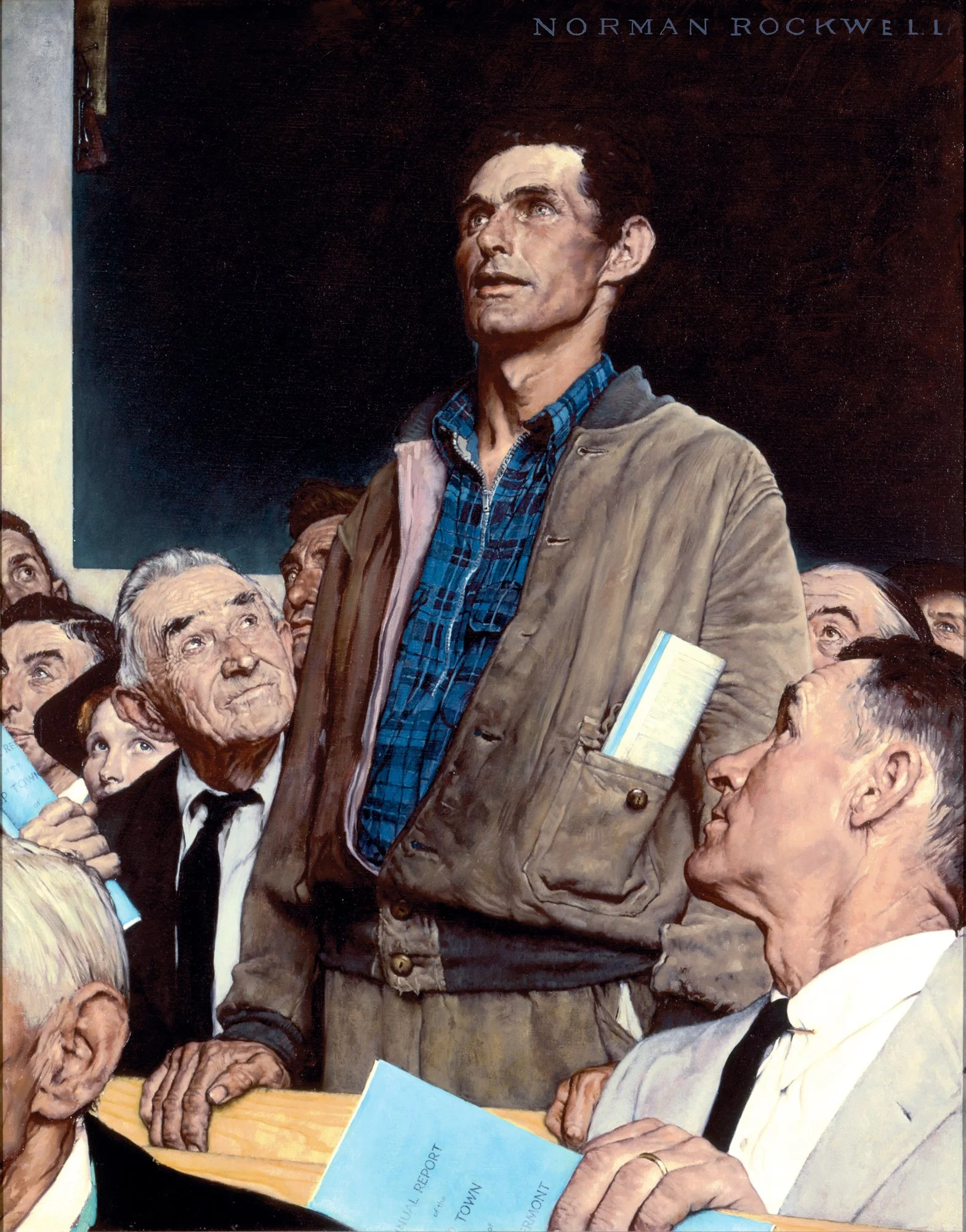Town meeting to consider HRA limits, expanded pot sales, zoning changes
/By Carol Britton Meyer
Hull voters will consider nearly 30 warrant articles at the May 1 annual town meeting, ranging from relatively routine matters, like budgets and seawall repairs, to more significant changes, such as allowing accessory apartments in single-family homes and approving marijuana sales in town.
NORMAN ROCKWELL’s ‘FREEDOM OF SPEECH,’ 1943.
Town Manager Philip Lemnios presented the select board with the latest version of the town meeting warrant this week for members’ information, but no discussion was held. That will come at a future board meeting closer to town meeting.
“I believe there is an expectation when there are warrant articles of import that the select board will take a position on them one way or another,” he said.
Voters will consider a number of changes to the zoning bylaws, including creating an inclusionary zoning requirement related to affordable residential units along with the accessory dwelling unit warrant article. Another proposal relates to lowering the rate of interest that accrues on property taxes deferred by eligible seniors to 2.5%.
If the accessory apartment article passes, homeowners of owner-occupied, single-family dwellings would be able to submit an application for a building permit for such a unit. The idea is to allow a limited number of accessory apartments without adding to the number of buildings in town and without reducing open space or substantially altering the appearance of the principal dwelling. Proponents believe it will provide for a more efficient and economic use of existing housing stock by enabling owners of single-family homes to share space and the burdens of homeownership, while also protecting the stability, property values, and residential character of neighborhoods.
Another article would allow the planning board to issue a special permit allowing new and existing buildings within a special flood hazard area to be elevated beyond the prescribed height limit to provide floodproofing meeting or exceeding the flood elevation requirements. Buildings could not exceed certain elevation requirements. Rooftop mechanicals appropriately screened or enclosed must be below the total allowed building height.
The inclusionary by-law requirement, if passed, would require developers of more than 10 units to designate a minimum of 10% of the total proposed units as affordable. It includes a mechanism to implement a selection process for who would be eligible to rent or purchase the designated units, including qualifying residents and town employees, as allowed under federal and state law.
Proponents say the purpose of this bylaw is to increase the supply of affordable rental and ownership housing in Hull spread across all zoning districts, and to encourage a greater diversity of housing to meet the needs of seniors, families, and individuals at all income levels, as well as to prevent the displacement of Hull residents. It is sponsored by George Boylen.
Voters will also be asked to amend the zoning bylaw to allow the town’s existing registered marijuana dispensary to add retail sales. If the article passes, the planning board would be able to grant a special permit to a dispensary that has been operating within the town for at least one year to authorize adult-use retail sales, subject to execution of a new host community agreement, submission of new applications for site plan approval, a special permit, and a determination that such a change would not negatively impact the town. Adding retail sales would require a license granted by the select board. (Inserted at the request of Meghan Sylvester.)
Other articles relate to:
* Amending the current zoning for the Hull Redevelopment Authority land as a Public Open Space District as defined in the Hull zoning bylaws (Inserted at the request of Susan Vermilya);
* Authorizing the select board to enter into negotiations with the state to lease DCR property to create economic development opportunities. (Inserted at the request of Bart Blumberg);
* Delaying decisions on development proposals for HRA land use until an independent study is performed that shows the impact that further development would have on the town’s current resources, including water, sewer, electricity, and the impact of climate change (Inserted at the request of Susan Vermilya);
* Establishing a citizen committee to interview the finalist for the town manager position (Inserted at the request of Anne Marie Papasodero);
* Setting term limits for all elected town boards (Inserted at the request of Christopher Sweeney);
* Allowing the Oscar Smith Mitchell American Legion Post 140 to hold its meetings at the Anne M. Scully Senior Center (Inserted at the request of Jim Richman).











